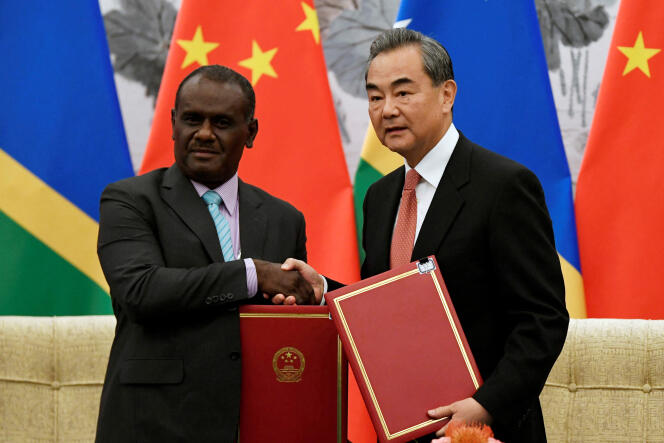
Former pro-China diplomat Jeremiah Manele was elected Prime Minister of the Solomon Islands, a Commonwealth member country, on Thursday May 2. In Parliament, Mr. Manele won 31 votes out of 50 in a secret ballot, announced the governor general of the Oceanian country, David Vunagi. His rival, opposition leader Matthew Wale, unfavorable to Beijing, obtained 18 votes.
In the archipelago, voters do not directly choose their prime minister. They elect representatives who negotiate behind closed doors to form a coalition and choose a leader, a process that can last weeks.
“The people have spoken”declared Mr. Manele, welcoming the fact that the vote took place without violence: “We showed the world today that we are better than that. »
Elections are often turbulent in the Solomon Islands. In 2000, Prime Minister Bart Ulufa’alu was forced to resign after being kidnapped by disgruntled gunmen, and in 2006 international peacekeeping forces were deployed to quell post-election violence.
A security pact signed with Beijing in 2022
Mr. Manele was serving as foreign minister in 2019, when the Solomon Islands turned away from Taiwan by establishing diplomatic ties with Beijing. Observers expect the new head of government to continue the archipelago’s friendly policy towards China.
The outgoing Prime Minister, Manasseh Sogavare, who did not run in this election, had signed a security pact with Beijing in 2022. Although the details of this agreement remain obscure, Washington and Canberra fear that it will be a first step leading to the installation of a permanent Chinese military base in the South Pacific; such a scenario could be a game-changer in terms of regional security.
The Prime Minister-elect promised “a government of national unity” which will focus on improving the economy and “progress on (there) road to recovery » after the Covid-19 pandemic. Bills around value added tax (VAT) or the establishment of a special economic zone are among the announced priorities of the new government.
China has financed several major projects, including a 10,000-seat athletics stadium and a medical center still under construction. But the country of some 720,000 inhabitants spread across hundreds of volcanic islands and atolls has one of the lowest human development indexes in the world, according to the United Nations.
The World Application
The Morning of the World
Every morning, find our selection of 20 articles not to be missed
Download the app
On the eve of the elections, which took place on April 17, Daniel Suidani, a leading opposition figure and former provincial premier, described China’s actions as“alarming”.
